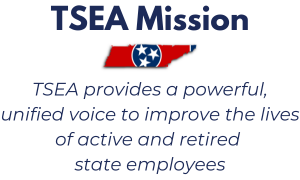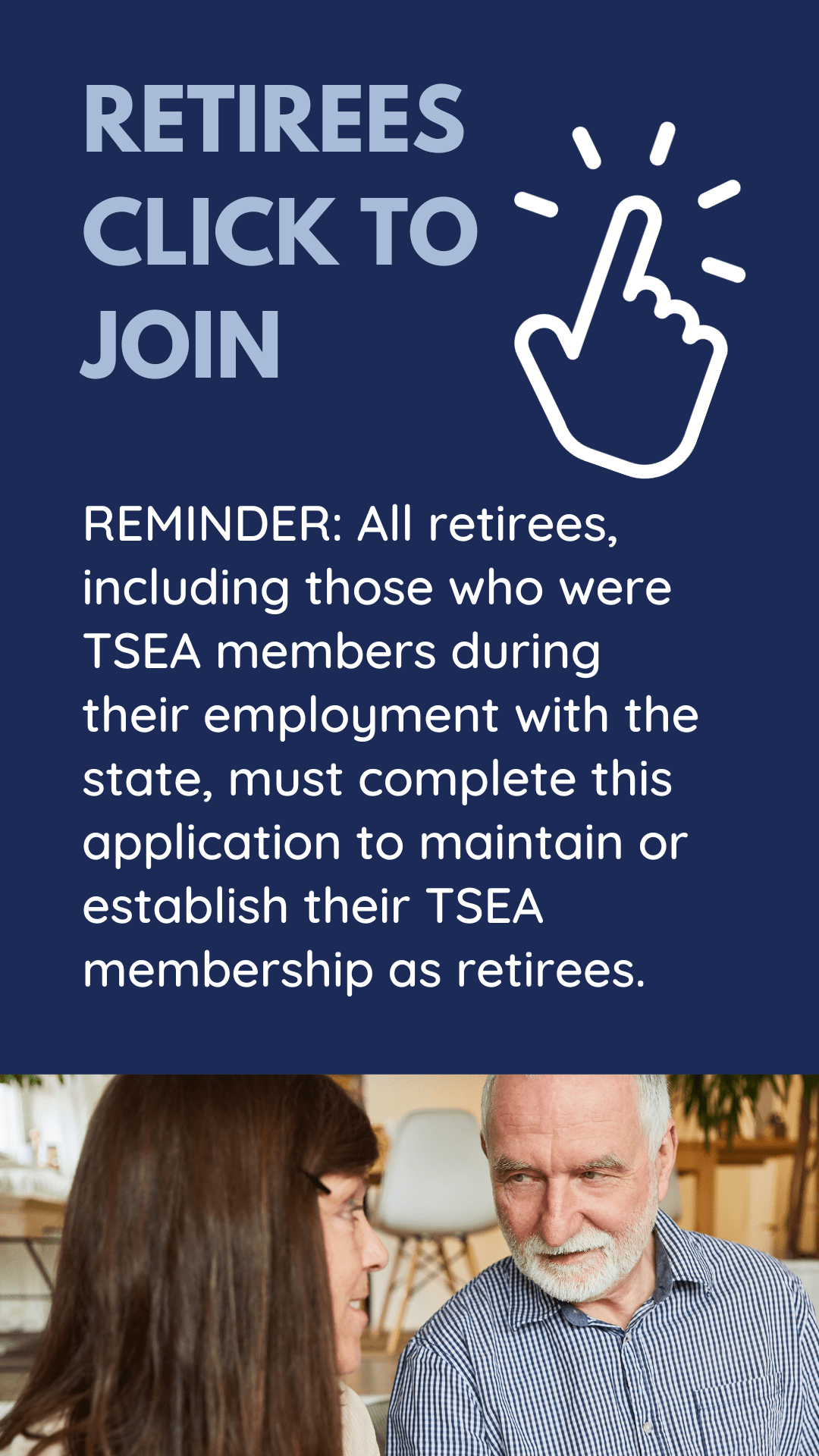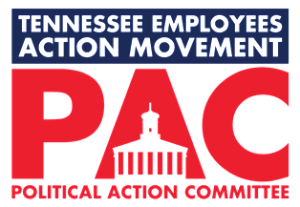Proposed TEAM Act Changes
TSEA Bill: HB1940 (Dunn) / SB2045 (Southerland)
DOHR Bill: HB1420 (Dunn) / SB1624 (Johnson)
Both TEAM Act revision bills passed the full House and Senate this week. The successful passage of these amendments reinforce our joint effort to continue to work together with DOHR to continue monitoring the bill’s implementation and make changes as necessary to ensure state employees’ concerns are addressed.
Just as a reminder, TSEA and DOHR negotiated a compromise on these 2 bills. Combined, the bills do the following:
- Allow audio recordings of Level 1 hearings
- Allow employee representation and participation at Level 1 hearings when the agency has more than one person present.
- Expands the Board of Appeals to up to 18 members to accommodate 2 monthly hearing dates.
- Requires all employees to submit a written statement at a Level 2 hearing that explains why you feel that the Step 1 decision was wrong. If this written statement is not included in Level 2, the decision of the DOHR Commissioner is final and you forfeit your right to a Level 3 appeal before the Board.
- All Level 3 hearings require the employee to participate in person, by counsel or through electronic means.
TSEA and DOHR will continue working together through the summer to address plans for reviewing Performance Evaluations opposed by the employee and help during RIFs to find another state job. Meetings on the TEAM Act issues will resume as soon as the legislative session has ended.
Parking Relief for Higher Ed Employees
HB1306 (Windle) / SB 1369 (Tate)
This bill has received considerable debate in the House Education Subcommittee this week. The committee was very upset that the pilot project was unsuccessfully implemented at the University of Memphis, and members voted to move this bill onto the full committee. This was done, even after the Committee Chair attempted to kill the bill because it was not moving in the Senate and the Senate Committee was closing this week. After much discussion and a break to confer with the Senate Sponsor, the bill moved forward with the assumption that Senate would reopen the committee to hear the bill in the upcoming week.
With that said, this bill will be before both the House and Senate full Education Committees this week. This was a huge victory on behalf of higher education employees, because it is now well documented that it is unfair and unacceptable for one group of employees to pay to park at work while all other employees do not. The issue at the center of the bill, however, is in regards to funding. Parking on higher education campuses are funded by revenue generating bonds and because of those bonds, the State cannot offer free parking to everyone. This bill would allow free parking for anyone making less than the average salary for state employees, which is presently $39,000. To compensate for giving a break on parking fees for the lowest paid, this bill would require the colleges to make up the revenue by establishing tiered fee structures for higher paid staff.
Please note that the House Committee expressed concern that the fiscal burden would significantly increase the fees for the higher paid employees, and discussed lowering the income threshold, giving free parking for those making less than $10 or $11 dollars an hour. This would help the lowest paid staff and create a lower increase for everyone else. TSEA is working on an amendment which would eliminate the fiscal note and allow the Senate Committee to reopen to consider the bill. TSEA is also conducting a survey of all higher education members, asking for their opinions on all possible scenarios so that we can amend the bill to best serve our members needs. This bill was brought to our Legislative Agenda last year by our Higher Education Committee, but we do not want unintended consequences for our membership. If you are a higher education TSEA member, please check your email for our survey and complete it immediately as this bill will have only one final chance to be heard next week.
Grandfathering TDOT Employees without a GED
HB1542 (Bailey) / SB1705 (Niceley)
This bill passed in the Senate State & Local Government Committee and the House State Government Committee this week with an amendment. As introduced, the bill proposed that a state employee with 10 or more years of state service could keep their job without a GED.
The amended version of the bill would see TDOT reestablish positions (not higher than a salary grade 15) which do not require a GED. To be eligible, the TDOT employee would have to:
- Be eligible for full service retirement on or before September 1, 2016;
- Have completed a department-approved program to obtain a high school diploma or equivalent certification, including have taken the test by or before September 1, 2015; and
- Apply, interview, be selected for, and be placed in such a position by no later than September 1, 2015.
In the legislative committee discussions, TDOT confirmed their commitment to allow all employees who are trying to get their GED to stay employed. They do not want to layoff anyone who is trying, and this bill simply puts their intentions for those close to retirement into code. While the department only addressed those eligible to retire in the amendment, it is a step in the right direction.
We have TDOT on record as to their intentions, which will hopefully give our members some relief from the anxiety of being laid off next year. The department has promised, at our request, to update TSEA and the legislature this summer and before next legislative session as to how many employees still need their GED. This will allow us to consider further amendments to protect more of the affected employees, if necessary, before the September 2015 deadline. This bill will be heard next in the Senate Finance and House Budget Subcommittees this week.
Retiree / Spouse Tuition Discount
HB887 (Hawk) / SB1164 (Hensley)
This bill has passed through the House and is behind the budget, which means we have to find funding for it in the budget. We have met with and asked the Administration to consider this bill in its Drive to 55 package, and our sponsors are trying to find funding via every possible avenue. In the Senate Education Committee, it passed with a 6-3 vote with a fiscal note of roughly $10,000. If you recall, within days of this bill moving in committee, THEC revised the fiscal note to be over $1.3 million.
TSEA is working with the Fiscal Review Committee, the Finance Committees, and our sponsors to address this new fiscal issue. We expect another meeting this week with THEC and Fiscal Review, and hope to persuade the agency to understand why this fiscal note is unacceptable. This may result in further amendments, but it is our intention to continue pursuing this bill and fund it this year. Expect an update on this issue in next week’s legislative update.
Limitations on Employee Rights from Workplace Harassment
SB 2126 (Johnson) / HB1954 (V. Dennis)
This bill was brought forward by the NFIB and Chamber of Commerce. The original bill eliminated protections for whistleblowers and limited the amount of damages that could be granted in lawsuits, but has since been amended to retain existing whistleblower protections. However, TSEA still has concerns. This week, Executive Director Bob O’Connell testified against this bill in the Senate Commerce Committee and in the House Consumer Subcommittee. He pointed out concerns with the bill as listed below:
- Present law makes it illegal to discriminate against a person in employment or to help or order another person to discriminate. Under the first section of this bill, the new law will make it legal to help or order another person to discriminate.
- The second section of the bill puts unnecessary cops on the amount a person can be awarded in a discrimination suit, fixing a problem that doesn’t exist.
- Under present common law, a person terminated for reasons which are in part discriminatory can seek damages for that termination. Under the new law, discrimination must have been the sole reason for termination.
The committee members were not swayed by our director’s testimony, and the bill passed both committees. We will be asking you to contact your legislators as soon as this bill moves to the House and Senate floors for full votes. Please watch for further directions in our upcoming legislative updates.
Update on proposed raise for State Employees
Most of the discussion on Lobby Day focused on the fact that the present proposed budget includes a 2% raise for teachers but only a 1% raise for state employees and employees in higher education. As we anxiously await a supplemental budget from the Governor’s Office, TSEA has been told by both House and Senate Leadership that we should prepare ourselves for the raise to be eliminated completely from the budget. Executive Director Bob O’Connell has requested a meeting with the Commissioner of Finance & Administration, Larry Martin. This meeting is scheduled for Monday, March 31, and President Phil Morson is expected to attend. They will present our case to fund the raise and request that it not be eliminated from the budget.
We are working closely with House Finance Chair Charles Sargent and Lt. Governor Ron Ramsey on a contingency plan if necessary. Both legislators – along with many others – are willing to put our raise as a first priority for funding once excess revenue is collected after the budget passes; however, TSEA will first pursue full funding in this budget cycle with Commissioner Larry Martin.
Relief on Proposed Insurance Premium Increase
As stated above, we are still waiting on the supplemental budget from the Governor, in which we hope to see a reduction in the increase of premium for health insurance. The present proposed budget includes a 5.5% raise in premiums, but TSEA has negotiated a reduction in this increase due to the excess funds in our insurance reserve fund. We anticipate that the supplemental budget will reduce the proposed increase, but we do not know exactly how much until the supplemental budget is presented. This reduction would not be possible without TSEA’s bill and our negotiations with Benefits and Administration.
Other bills we’re watching
Payroll Deduction Bill
HB0502 (Casada) / SB0490 (Kelsey)
As most of you are aware, TSEA has continually fought against all bills that would change our payroll deduction of dues. This bill has been successfully defeated, as both sponsors have committed to taking the bills off notice for this year. Rep. Casada, who has carried this bill for several years, has agreed to work with TSEA over the summer to negotiate language requiring all labor organizations to model their payroll deduction practices after TSEA. TSEA allows its members to decide if they want any of their dues to go to our political action committee for campaign donations, and all of our expenditures are available at all times to our membership and to the public via our online PAC disclosures and our IRS 990 forms as filed with the Secretary of State. We hope that if Rep. Casada can draft a bill similar to our present policy, this issue will be closed and thus become one less item we have to fight against every year.
Disruptive Employee Organization & Union Activities
HB1687 (Durham) / SB1662 (Kelsey)
This bill prohibits certain union and employee organization activities and makes certain disruptive and illegal conduct involving unions and employee organizations a criminal offense. While TSEA does not condone this behavior and we do not participate in any strikes, we are still concerned with the unintended consequences of this bill, should it result in activities such as workplace recruiting being considered coercion. We have expressed our concern to the committees in which this bill has been heard, and as it stands now, we do not believe it directly impacts our activities at TSEA.
An Attorney General’s opinion has been requested on this bill, and it presently is set to be heard in the Senate Judiciary Committee and the House Criminal Committee next week. This bill is expected to fail the House committee, and TSEA is actively lobbying legislators as to our concerns. It was brought to Tennessee by an outside organization, the US Chamber of Commerce, like many of the other bills that are anti-labor. Every year, TSEA has stood up against this movement, reminding legislators that we do not have a problem in Tennessee and that these bills are unnecessary. To date, we have been successful in defeating this type of legislation.
Demonstrating/Picketing Over Labor Disputes
HB1688 (Durham) / SB1661 (Kelsey)
This bill makes mass picketing and targeted residential picketing a criminal offenses. Again, while TSEA does not strike, we believe in everyone’s constitutional right to lawfully protest. The Attorney General has ruled that this bill is suspect to being unconstitutional as it applies specifically to labor. If the bill was amended to address the issue of blocking ingress and egress to a place of business and not implicate labor activities specifically, then it would be constitutional. The House sponsor has questioned the AG opinion and does not think the bill is unconstitutional. So if this bill passes, it will be up to the court system to decide.
This bill will be heard in the House Consumer Committee and possibly the Senate Judiciary Committee this week. We have been told that the Governor will not sign this bill should it pass, so hopefully these committees will trust in the Attorney General and oppose this legislation. TSEA, again, is actively addressing our concerns with the constitutionality of this bill and everyone’s right to protest.
As always, we will make you aware of updates and developments as information comes available, and will put the word out if your help is needed in contacting legislators regarding our bills.
For updates on all of TSEA’s legislation, visit our website’s 2014 Legislation Page and follow us on Twitter @tseaonline for live updates in committees discussing our bills.

















